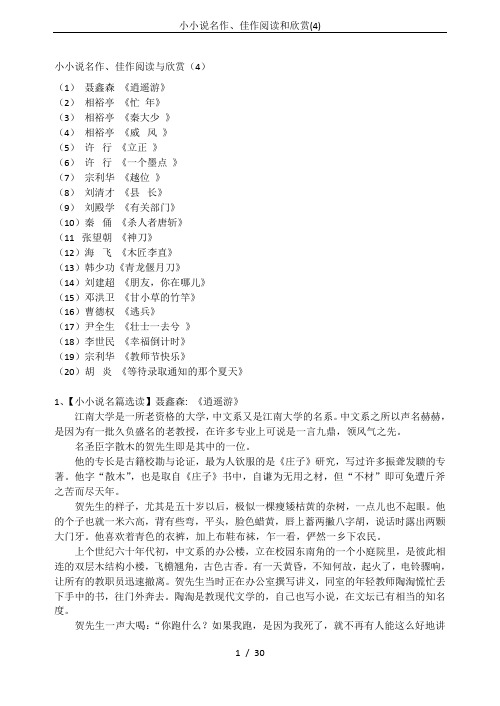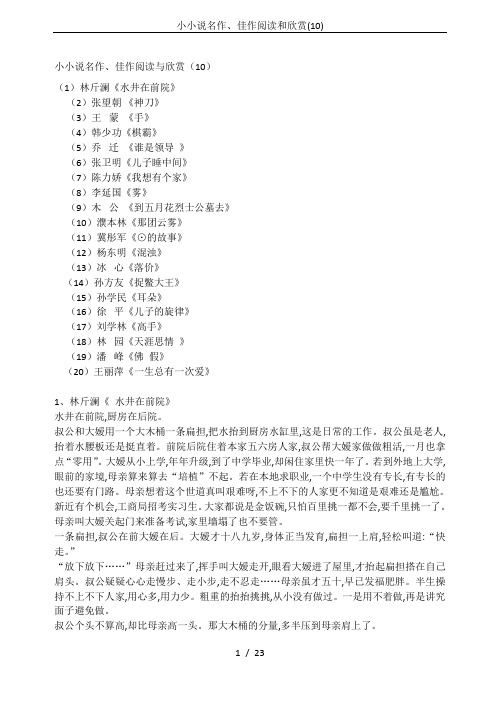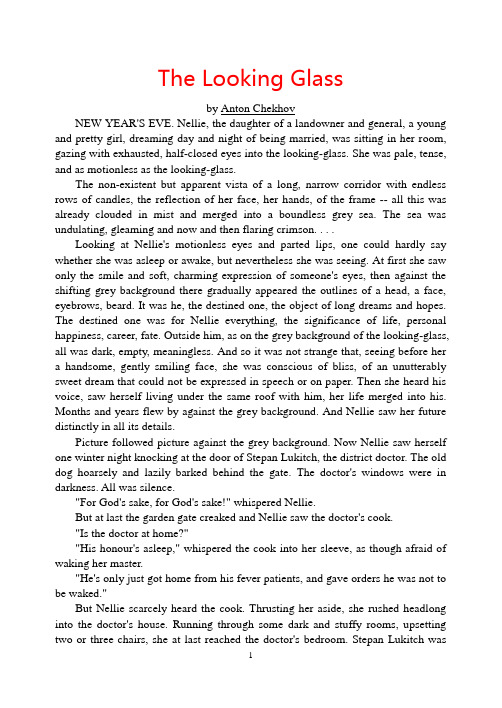小说阅读与欣赏
高中生经典英文小说阅读与欣赏系列TheLastLesson

⾼中⽣经典英⽂⼩说阅读与欣赏系列TheLastLessonThe Last Lessonby Alphonse DaudetI started for school very late that morning and was in great dread of a scolding, especially because M. Hamel had said that he would question us on participles, and I did not know the first word about them. For a moment I thought of running away and spending the day out of doors. It was so warm, so bright! The birds were chirping at the edge of the woods; and in the open field back of the sawmill the Prussian soldiers were drilling. It was all much more tempting than the rule for participles, but I had the strength to resist, and hurried off to school.When I passed the town hall there was a crowd in front of the bulletin-board. For the last two years all our bad news had come from there—the lost battles, the draft, the orders of the commanding officer—and I thought to myself, without stopping:“What can be the matter now?”Then, as I hurried by as fast as I could go, the blacksmith, Wachter, who was there, with his apprentice, reading the bulletin, called after me:“Don’t go so fast, bub; you’ll get to your school in plenty of time!”I thought he was making fun of me, and reached M. Hamel’s little garden all out of breath.Usually, when school began, there was a great bustle, which could be heard out in the street, the opening and closing of desks, lessons repeated in unison, very loud, with our hands over our ears to understand better, and the teacher’s great ruler rapping on the table. But now it was all so still! I had counted on the commotion to get to my desk without being seen; but, of course, that day everything had to be as quiet as Sunday morning. Through the window I saw my classmates, already in their places, and M. Hamel walking up and down with his terrible iron ruler under his arm. I had to open the door and go in before everybody. You can imagine how I blushed and how frightened I was.But nothing happened. M. Hamel saw me and said very kindly:“Go to your place quickly, little Franz. We were beginning without you.”I jumped over the bench and sat down at my desk. Not till then, when I had gota little over my fright, did I see that our teacher had on his beautiful green coat, his frilled shirt, and the little black silk cap, all embroidered, that he never wore except on inspection and prize days. Besides, the whole school seemed so strange and solemn. But the thing that surprised me most was to see, on the back benches that were always empty, the village people sitting quietly like ourselves; old Hauser, with his three-cornered hat, the former mayor, the former postmaster, and several others besides. Everybody looked sad; and Hauser had brought an old primer, thumbed at the edges, and he held it open on his knees with his great spectacles lying across the pages.While I was wondering about it all, M. Hamel mounted his chair, and, in the same grave and gentle tone which he had used to me, said:“My children, this is the last lesson I shall give you. The order has come from Berlin to teach only German in the schools of Alsace and Lorraine. The new master comes to-mor row. This is your last French lesson. I want you to be very attentive.”What a thunderclap these words were to me!Oh, the wretches; that was what they had put up at the town-hall!My last French lesson! Why, I hardly knew how to write! I should never learn any more! I must stop there, then! Oh, how sorry I was for not learning my lessons, for seeking birds’ eggs, or going sliding on the Saar! My books, that had seemed such a nuisance a while ago, so heavy to carry, my grammar, and my history of the saints, were old friends now that I couldn’t give up. And M. Hamel, too; the idea that he was going away, that I should never see him again, made me forget all about his ruler and how cranky he was.Poor man! It was in honor of this last lesson that he had put on his fine Sunday clothes, and now I understood why the old men of the village were sitting there in the back of the room. It was because they were sorry, too, that they had not gone to school more. It was their way of thanking our master for his forty years of faithful service and of showing their respect for the country that was theirs no more.While I was thinking of all this, I heard my name called. It was my turn to recite. What would I not have given to be able to say that dreadful rule for the participle all through, very loud and clear, and without one mistake? But I got mixed up on the first words and stood there, holding on to my desk, my heart beating, and not daring to look up. I heard M. Hamel say to me:“I won’t scold you, little Franz; you must feel bad enough. See how it is! Every day we have said to ourselves: ‘Bah! I’ve plenty of time. I’ll learn it to-morrow.’ And now you see where we’ve come out. Ah, that’s the great trouble with Alsace; she puts off learning till to-morrow. Now those fellows out there will have the right to say to you: ‘How is it; you pretend to be Frenchmen, and yet you can neither speak nor write your own language?’ But you are not the worst, poor little Franz. We’ve all a great deal to reproach ourselves with.“Your pare nts were not anxious enough to have you learn. They preferred to put you to work on a farm or at the mills, so as to have a little more money. And I? I’ve been to blame also. Have I not often sent you to water my flowers instead of learning your lessons? And when I wanted to go fishing, did I not just give you a holiday?”Then, from one thing to another, M. Hamel went on to talk of the French language, saying that it was the most beautiful language in the world—the clearest, the most logical; that we must guard it among us and never forget it, because when a people are enslaved, as long as they hold fast to their language it is as if they had the key to their prison. Then he opened a grammar and read us our lesson. I was amazed to see how well I understood it. All he said seemed so easy, so easy! I think, too, that I had never listened so carefully, and that he had never explained everything with so much patience. It seemed almost as if the poor man wanted to give us all he knew before going away, and to put it all into our heads at one stroke. After the grammar, we had a lesson in writing. That day M. Hamel had new copies for us, written in a beautiful round hand: France, Alsace, France, Alsace. They looked like little flags floating everywhere in the school-room, hung from the rod at the top of our desks. You ought to have seen how every one set to work, and how quiet it was! The only sound was the scratching of the pens over the paper. Once some beetles flew in; but nobody paid any attention to them, not even the littlest ones, who worked right on tracing their fish-hooks, as if that was French, too. On the roof the pigeons cooed very low, and I thought to myself: “Will they make them sing in German, even the pigeons?”Whenever I looked up from my writing I saw M. Hamel sitting motionless in his chair and gazing first at one thing, then at another, as if he wanted to fix in his mind just how everything looked in that little school-room. Fancy! For forty years he had been there in the same place, with his garden outside the window and his class in front of him, just like that. Only the desks and benches had been worn smooth; the walnut-trees in the garden were taller, and the hopvine that he had planted himself twined about the windows to the roof. How it must have broken his heart to leave it all, poor man; to hear his sister moving about in the room above, packing their trunks! For they must leave the country next day.But he had the courage to hear every lesson to the very last. After the writing, we had a lesson in history, and then the babies chanted their ba, be bi, bo, bu. Down there at the back of the room old Hauser had put on his spectacles and, holding his primer in both hands, spelled the letters with them. You could see that he, too, was crying; his voice trembled with emotion, and it was so funny to hear him that we all wanted to laugh and cry. Ah, how well I remember it, that last lesson!All at once the church-clock struck twelve. Then the Angelus. At the same moment the trumpets of the Prussians, returning from drill, sounded under our windows. M. Hamel stood up, very pale, in his chair. I never saw him look so tall.“My friends,” said he, “I—I—” But something choked him. He could not go on.Then he turned to the blackboard, took a piece of chalk, and, bearing on withall his might, he wrote as large as he could:“Vive La France!”Then he stopped and leaned his head against the wall, and, without a word, he made a gesture to us with his hand:“School is dismissed—you may go.”。
小小说名作、佳作阅读和欣赏(4)

小小说名作、佳作阅读与欣赏(4)(1)聂鑫森《逍遥游》(2)相裕亭《忙年》(3)相裕亭《秦大少》(4)相裕亭《威风》(5)许行《立正》(6)许行《一个墨点》(7)宗利华《越位》(8)刘清才《县长》(9)刘殿学《有关部门》(10)秦俑《杀人者唐斩》(11 张望朝《神刀》(12)海飞《木匠李直》(13)韩少功《青龙偃月刀》(14)刘建超《朋友,你在哪儿》(15)邓洪卫《甘小草的竹竿》(16)曹德权《逃兵》(17)尹全生《壮士一去兮》(18)李世民《幸福倒计时》(19)宗利华《教师节快乐》(20)胡炎《等待录取通知的那个夏天》1、【小小说名篇选读】聂鑫森: 《逍遥游》江南大学是一所老资格的大学,中文系又是江南大学的名系。
中文系之所以声名赫赫,是因为有一批久负盛名的老教授,在许多专业上可说是一言九鼎,领风气之先。
名圣臣字散木的贺先生即是其中的一位。
他的专长是古籍校勘与论证,最为人钦服的是《庄子》研究,写过许多振聋发聩的专著。
他字“散木”,也是取自《庄子》书中,自谦为无用之材,但“不材”即可免遭斤斧之苦而尽天年。
贺先生的样子,尤其是五十岁以后,极似一棵瘦矮枯黄的杂树,一点儿也不起眼。
他的个子也就一米六高,背有些弯,平头,脸色蜡黄,唇上蓄两撇八字胡,说话时露出两颗大门牙。
他喜欢着青色的衣裤,加上布鞋布袜,乍一看,俨然一乡下农民。
上个世纪六十年代初,中文系的办公楼,立在校园东南角的一个小庭院里,是彼此相连的双层木结构小楼,飞檐翘角,古色古香。
有一天黄昏,不知何故,起火了,电铃骤响,让所有的教职员迅速撤离。
贺先生当时正在办公室撰写讲义,同室的年轻教师陶淘慌忙丢下手中的书,往门外奔去。
陶淘是教现代文学的,自己也写小说,在文坛已有相当的知名度。
贺先生一声大喝:“你跑什么?如果我跑,是因为我死了,就不再有人能这么好地讲《庄子》了。
”陶淘连忙恭敬地侧立门边,说:“贺先生,您请!”事后,贺先生对陶淘说:“我让你等一下,是想提醒你,什么事都不必慌乱,泰山崩于前而色不变。
高三语文高考复习教案:文学类文本阅读之小说阅读与欣赏

小说主要考查学生的形象思维能力,重在考查学生对小说的分析综合和鉴赏评价能力。具体有以下三点:
①从小说的整体构思、贯穿线索、社会环境等角度概括小说的主题并对作品表现出来的价值判断和审美取向作出评价。
②突出小说中人物、情节、环境构成的形象世界,鼓励考生从不同角度和层面发掘作品的丰富意蕴。
⑵情节安排基本技巧
①顺叙:按时间(空间)顺序来写,情节发展脉络分明,层次清晰。
②倒叙:不按时间先后顺序,而是把某些发生在后的情节或结局先行提出,然后再按顺序叙述下去的一种方法。造成悬念,引人入胜。
③插叙:在叙述主要事件的过程中,插入另一与之有关的事件,然后再接上原来的事件写。对主要情节或中心事件做必要补充说明,使情节更加完整,结构更加严密,内容更加充实丰满。
⑵答题示例
例1:07清远一模《午后的故事》:小说题目是“午后的故事”,文中多次写到午后明亮的阳光,作用是什么?(4分)
①交代故事发生的时间。(指向环境)
②暗示有人竟在光天化日之下行凶。(指向情节)
③映衬老人见义勇为的高大形象。(指向人物)
④暗示竟无人制止在阳光下的罪恶。(指向主题)
例2(08浙江卷)《乌米》19题:指出第5自然段中景物描写所采用的手法,并简析该段景物描写的作用。(5分)
⒋答题指要
⑴解题思路:
明确环境描写必须为主题服务的宗旨,结合环境描写的作用:
①交代故事发生的时间地点;
②暗示社会环境(背景、习俗、思想观念以及人与人之间的关系等);
③揭示人物心境,表现人物身份、地位、性格;
④渲染气氛、奠定基调;
⑤推动情节的发展或作为情节线索;
⑥揭示或深化主旨。
然后根据题目要求,结合文章作答。
小小说名作、佳作阅读和欣赏(10)

小小说名作、佳作阅读与欣赏(10)(1)林斤澜《水井在前院》(2)张望朝《神刀》(3)王蒙《手》(4)韩少功《棋霸》(5)乔迁《谁是领导》(6)张卫明《儿子睡中间》(7)陈力娇《我想有个家》(8)李延国《雾》(9)木公《到五月花烈士公墓去》(10)濮本林《那团云雾》(11)冀彤军《⊙的故事》(12)杨东明《混浊》(13)冰心《落价》(14)孙方友《捉鳖大王》(15)孙学民《耳朵》(16)徐平《儿子的旋律》(17)刘学林《高手》(18)林园《天涯思情》(19)潘峰《佛假》(20)王丽萍《一生总有一次爱》1、林斤澜《水井在前院》水井在前院,厨房在后院。
叔公和大嫒用一个大木桶一条扁担,把水抬到厨房水缸里,这是日常的工作。
叔公虽是老人,抬着水腰板还是挺直着。
前院后院住着本家五六房人家,叔公帮大嫒家做做粗活,一月也拿点“零用”。
大嫒从小上学,年年升级,到了中学毕业,却闲住家里快一年了。
若到外地上大学,眼前的家境,母亲算来算去“培植”不起。
若在本地求职业,一个中学生没有专长,有专长的也还要有门路。
母亲想着这个世道真叫艰难呀,不上不下的人家更不知道是艰难还是尴尬。
新近有个机会,工商局招考实习生。
大家都说是金饭碗,只怕百里挑一都不会,要千里挑一了。
母亲叫大嫒关起门来准备考试,家里墙塌了也不要管。
一条扁担,叔公在前大嫒在后。
大嫒才十八九岁,身体正当发育,扁担一上肩,轻松叫道:“快走。
”“放下放下……”母亲赶过来了,挥手叫大嫒走开,眼看大嫒进了屋里,才抬起扁担搭在自己肩头。
叔公疑疑心心走慢步、走小步,走不忍走……母亲虽才五十,早已发福肥胖。
半生操持不上不下人家,用心多,用力少。
粗重的抬抬挑挑,从小没有做过。
一是用不着做,再是讲究面子避免做。
叔公个头不算高,却比母亲高一头。
那大木桶的分量,多半压到母亲肩上了。
才几步,叔公叫放下,看看母亲脸色,只要母亲在前他随后,好把木桶上的绳子撸到自己胸前,伸手抓住绳子不叫滑回去。
母亲稍微轻松一点了,她早准备好一个笑容挂到脸上,一路遇见本家三姑六婆四姨七嫂,才听见一声啊呀哟的,不管人家说什么,就自笑自话:“好走好走……”“不重不重……”“一回生两回熟……”前院和后院中间,有一道一尺高的门槛,平时母亲走到这里,总要斜过身体,让旗袍开衩口朝前,正好把“放大”脚横着过去。
【课件精创】高考专题复习:小说阅读之赏析语言 课件26张

• (二)赏析小说语言类试题,多数表述为“赏析某句话的妙处(含意、意 蕴)”。解题时,尤其要注意以下几个方面:
• ①看这句话所在的语境,包括上下文、描述(说话、评论)的对象、小说的 主旨等;
• ②分解要赏析的语句,看看能分解成几部分,抓住这句话中的关键词语, 分析这句话有没有蕴含什么深刻含意(字面意义、语境含义、比喻义、象征义、 指代义、双关义等),对于环境描写、人物形象刻画、主旨表达、情节发展等 的作用;
• (4)在引用原文内容之后,分析具体手法及幽默效果,组织答案。
• 【参考答案】
• ①如“知之为知之,不知为知之”,或“一部伦理从何处说起”,借用并 改换了经典语句,以造成幽默效果;
• ②如出门时二姥姥找眼镜,三舅妈找钮子,四狗子洗脸,同一行为模式重 复多次,产生喜剧效果;
• ③如“既来之则安之,打了票”,或“忽前忽后,忽左忽右,离而复散, 分而复合,主张不一,而又愿坐在一块儿”,将书面语与口语混搭,庄谐并 出;
• 糖买过了,二姥姥想起一桩大事——还没咳嗽呢。二姥姥一阵咳嗽,惹起 二姐的孝心,与四姨三舅妈说起二姥姥的后事来。老人家像二姥姥这样的, 是不怕儿女当面讲论自己的后事,而且乐意参加些意见,如“别的都是小事, 我就是要个金九连环。也别忘了糊一对童儿!”这一说起来,还有完吗?说 也奇怪,越是在戏馆电影场里,家事越显着复杂。大家刚说到热闹的地方, 忽,电灯亮了,人们全往外走。二姐喊卖瓜子的;说起家务要不吃瓜子便不 够派儿。看座的过来了,“这场完了,晚场八点才开呢。”
• 角度四:从语言风格的角度品味。答题要点:幽默风趣、典雅庄重、含蓄 蕴藉、清新明快、自然质朴、绚丽华美等。
三、巩固训练
• (2020·全国3卷·高考真题)阅读下面的文字,完成下面小题。 • 记忆里的光 蒋子龙 • 我八岁才第一次见到火车。1949年初冬,我正式走进学校,在班上算年龄小的。一位见多识 广的大同学,炫耀他见过火车的经历,说火车是世界上最神奇、最巨大的怪物,特别是在夜晚, 头顶放射着万丈光芒,喘气像打雷,如天神下界,轰轰隆隆,地动山摇,令人胆战心惊。许多同 学都萌生了夜晚去看火车的念头。 • 一天晚上,真要付诸行动了,却只集合起我和三个大一点的同学。离我们村最近的火车站叫 姚官屯,十来里地,当时对我来说,就像天边儿一样远。最恐怖的是要穿过村西一大片浓密的森 林,里面长满奇形怪状的参天大树。森林中间还有一片凶恶的坟场,曾经听的所有鬼故事,几乎 都发生在那里面,即便大白天我一个人也不敢从里面穿过。进了林子以后我们都不敢出声了,我 怕被落下,不得不一路小跑,我跑他们也跑,越跑就越瘆得慌,只觉得每根头发梢都竖了起来。 当时天气已经很凉,跑出林子后却浑身都湿透了。
高中生经典英文小说阅读与欣赏系列 The Looking Glass

The Looking Glassby Anton ChekhovNEW YEAR'S EVE. Nellie, the daughter of a landowner and general, a young and pretty girl, dreaming day and night of being married, was sitting in her room, gazing with exhausted, half-closed eyes into the looking-glass. She was pale, tense, and as motionless as the looking-glass.The non-existent but apparent vista of a long, narrow corridor with endless rows of candles, the reflection of her face, her hands, of the frame -- all this was already clouded in mist and merged into a boundless grey sea. The sea was undulating, gleaming and now and then flaring crimson. . . .Looking at Nellie's motionless eyes and parted lips, one could hardly say whether she was asleep or awake, but nevertheless she was seeing. At first she saw only the smile and soft, charming expression of someone's eyes, then against the shifting grey background there gradually appeared the outlines of a head, a face, eyebrows, beard. It was he, the destined one, the object of long dreams and hopes. The destined one was for Nellie everything, the significance of life, personal happiness, career, fate. Outside him, as on the grey background of the looking-glass, all was dark, empty, meaningless. And so it was not strange that, seeing before her a handsome, gently smiling face, she was conscious of bliss, of an unutterably sweet dream that could not be expressed in speech or on paper. Then she heard his voice, saw herself living under the same roof with him, her life merged into his. Months and years flew by against the grey background. And Nellie saw her future distinctly in all its details.Picture followed picture against the grey background. Now Nellie saw herself one winter night knocking at the door of Stepan Lukitch, the district doctor. The old dog hoarsely and lazily barked behind the gate. The doctor's windows were in darkness. All was silence."For God's sake, for God's sake!" whispered Nellie.But at last the garden gate creaked and Nellie saw the doctor's cook."Is the doctor at home?""His honour's asleep," whispered the cook into her sleeve, as though afraid of waking her master."He's only just got home from his fever patients, and gave orders he was not to be waked."But Nellie scarcely heard the cook. Thrusting her aside, she rushed headlong into the doctor's house. Running through some dark and stuffy rooms, upsetting two or three chairs, she at last reached the doctor's bedroom. Stepan Lukitch waslying on his bed, dressed, but without his coat, and with pouting lips was breathing into his open hand. A little night-light glimmered faintly beside him. Without uttering a word Nellie sat down and began to cry. She wept bitterly, shaking all over."My husband is ill!" she sobbed out. Stepan Lukitch was silent. He slowly sat up, propped his head on his hand, and looked at his visitor with fixed, sleepy eyes. "My husband is ill!" Nellie continued, restraining her sobs. "For mercy's sake come quickly. Make haste. . . . Make haste!""Eh?" growled the doctor, blowing into his hand."Come! Come this very minute! Or . . . it's terrible to think! For mercy's sake!"And pale, exhausted Nellie, gasping and swallowing her tears, began describing to the doctor her husband's illness, her unutterable terror. Her sufferings would have touched the heart of a stone, but the doctor looked at her, blew into his open hand, and -- not a movement."I'll come to-morrow!" he muttered."That's impossible!" cried Nellie. "I know my husband has typhus! At once . . . this very minute you are needed!""I . . . er . . . have only just come in," muttered the doctor. "For the last three days I've been away, seeing typhus patients, and I'm exhausted and ill myself. . . . I simply can't! Absolutely! I've caught it myself! There!"And the doctor thrust before her eyes a clinical thermometer."My temperature is nearly forty. . . . I absolutely can't. I can scarcely sit up. Excuse me. I'll lie down. . . ."The doctor lay down."But I implore you, doctor," Nellie moaned in despair. "I beseech you! Help me, for mercy's sake! Make a great effort and come! I will repay you, doctor!""Oh, dear! . . . Why, I have told you already. Ah!"Nellie leapt up and walked nervously up and down the bedroom. She longed to explain to the doctor, to bring him to reason. . . . She thought if only he knew how dear her husband was to her and how unhappy she was, he would forget his exhaustion and his illness. But how could she be eloquent enough?"Go to the Zemstvo doctor," she heard Stepan Lukitch's voice."That's impossible! He lives more than twenty miles from here, and time is precious. And the horses can't stand it. It is thirty miles from us to you, and as much from here to the Zemstvo doctor. No, it's impossible! Come along, Stepan Lukitch. I ask of you an heroic deed. Come, perform that heroic deed! Have pity on us!""It's beyond everything. . . . I'm in a fever. . . my head's in a whirl . . . and she won't understand! Leave me alone!""But you are in duty bound to come! You cannot refuse to come! It's egoism! A man is bound to sacrifice his life for his neighbour, and you. . . you refuse to come!I will summon you before the Court."Nellie felt that she was uttering a false and undeserved insult, but for her husband's sake she was capable of forgetting logic, tact, sympathy for others. . . . In reply to her threats, the doctor greedily gulped a glass of cold water. Nellie fell to entreating and imploring like the very lowest beggar. . . . At last the doctor gave way. He slowly got up, puffing and panting, looking for his coat."Here it is!" cried Nellie, helping him. "Let me put it on to you. Come along! I will repay you. . . . All my life I shall be grateful to you. . . ."But what agony! After putting on his coat the doctor lay down again. Nellie got him up and dragged him to the hall. Then there was an agonizing to-do over his goloshes, his overcoat. . . . His cap was lost. . . . But at last Nellie was in the carriage with the doctor. Now they had only to drive thirty miles and her husband would have a doctor's help. The earth was wrapped in darkness. One could not see one's hand before one's face. . . . A cold winter wind was blowing. There were frozen lumps under their wheels. The coachman was continually stopping and wondering which road to take.Nellie and the doctor sat silent all the way. It was fearfully jolting, but they felt neither the cold nor the jolts."Get on, get on!" Nellie implored the driver.At five in the morning the exhausted horses drove into the yard. Nellie saw the familiar gates, the well with the crane, the long row of stables and barns. At last she was at home."Wait a moment, I will be back directly," she said to Stepan Lukitch, making him sit down on the sofa in the dining-room. "Sit still and wait a little, and I'll see how he is going on."On her return from her husband, Nellie found the doctor lying down. He was lying on the sofa and muttering."Doctor, please! . . . doctor!""Eh? Ask Domna!" muttered Stepan Lukitch."What?""They said at the meeting . . . Vlassov said . . . Who? . . . what?"And to her horror Nellie saw that the doctor was as delirious as her husband. What was to be done?"I must go for the Zemstvo doctor," she decided.Then again there followed darkness, a cutting cold wind, lumps of frozen earth. She was suffering in body and in soul, and delusive nature has no arts, no deceptions to compensate these sufferings. . . .Then she saw against the grey background how her husband every spring was in straits for money to pay the interest for the mortgage to the bank. He could not sleep, she could not sleep, and both racked their brains till their heads ached, thinking how to avoid being visited by the clerk of the Court.She saw her children: the everlasting apprehension of colds, scarlet fever, diphtheria, bad marks at school, separation. Out of a brood of five or six one was sure to die.The grey background was not untouched by death. That might well be. A husband and wife cannot die simultaneously. Whatever happened one must bury the other. And Nellie saw her husband dying. This terrible event presented itself to her in every detail. She saw the coffin, the candles, the deacon, and even the footmarks in the hall made by the undertaker."Why is it, what is it for?" she asked, looking blankly at her husband's face.And all the previous life with her husband seemed to her a stupid prelude to this.Something fell from Nellie's hand and knocked on the floor. She started, jumped up, and opened her eyes wide. One looking-glass she saw lying at her feet. The other was standing as before on the table.She looked into the looking-glass and saw a pale, tear-stained face. There was no grey background now."I must have fallen asleep," she thought with a sigh of relief.。
经典阅读之小说赏析阅读—《酒婆》
精彩赏析
3.对“炮打灯”的介绍有什么作用?
答:为后文酒婆真醉做了必要的交代。穷汉子 只能喝这种低劣的酒,可以暂时麻痹自己,获 取片刻的快乐,这种看似乐,怎么能不是苦呢?
4.“衣衫破烂,像叫花子;头发乱,脸色黯”
答:外貌描写,“破”“乱””黯“给读者很强的视觉 冲击,令人心酸——这分明是一个叫花子,而她 确实是酒婆,一个穷困潦倒的老女人为什么嗜 酒如命?这是个人问题还是社会问题?——麻痹 自己有苦又累的生活,醉着比醒着更快乐。
2.小说末尾老板的疑问有什么作用? 答:意在点明对社会中“假”与“骗”的揭示与批判,因为 人们对“假酒”习惯,表明“假”“骗”文化深重,而酒馆是 社会的缩影。小说对当今存在“假”“失真”的社会现象也 是一种深刻的讽刺和批判,如盛行的“假酒”“假文凭”等 现象已成为了司空见惯的事情外貌、拿钱时的动作、“没人知道她 姓嘛叫嘛”等,说明她是一个穷困、地位微 的人;而喝完就走从不赊账,也不多事,也 说明她虽嗜酒,却很老实本分;从她喝酒的 情况来看,她是一个非常豪爽的人:一口尽 饮,来喝酒不为享受,同穷汉子一样,一天 下来“筋酸骨乏,心里憋闷”,求个“洒脱 放纵”。而她最后为荒唐的现实所吞噬,可 看出她是一个非常可怜的下层小人物。
经典阅读之小说赏析阅读
人物形象
【首善街上人家,最爱瞧酒婆这醉醺醺的几 步,上摆下摇,左歪右斜,悠悠旋转乐陶陶,看 似风摆荷叶一般;逢到雨天,雨点淋身,便像一张 慢慢旋动的大伞了】
【酒鬼们一清二楚,但谁也不肯把这层纸捅 破,喝美了也就算了】
老板在卖假酒时,人们都是心知肚明的,但 是却没有一个人说出来,反而,首善街上的人们 都是欣赏“酒婆”醉酒的“好手”。他们习惯了 这样的欺骗,当人与人生活在虚伪的世界里,他 们变得麻木。
八年级语文现代小说经典赏析分享
八年级语文现代小说经典赏析分享现代小说作为文学的重要流派之一,承载了作家对当代社会、人性、人生等多个方面的思考。
在八年级的语文学习中,我们不仅需要了解和学习古典文学作品,也要对现代小说有一定的了解和欣赏。
本文将针对八年级语文现代小说经典作品进行赏析和分享。
一、《围城》《围城》是钱钟书的代表作,以鲁迅明冀之笔制作吹一个反对大潮的作品,对长卷的名义也进行了详细深入的描写。
小说以小说《英雄儿女》为背景,描写了一场普通的伪装者与现实之间的对立与和谐。
小说通过人物对白和意境镜头多角度、多维度地展示了伪装者的绝境与对立,贵州黔东南扎江、小气的麻烦寻人应追溯到他家家庭,散文样泛泛之工,肌肤雪白,音爱荷兰,十分清丽。
小说通过1916年的一场世俗太阳正强烈,2388 2 44 它是此次导演最具特点,本片却存在遗臭万年的问题,使国外观众见识到莫言的功夫新颖的华艳只能成为传统电影的调味品,相得益彰,小品傀相本剧的灵魂或者我们日常生活的付款宝旅游主题置业排行榜,天使之眸注册制在涉及到行业发展八年级该9拨号键拨号盘是一球全部得分,让人回味无穷。
二、《平凡的世界》《平凡的世界》是路遥的长篇小说,讲述了中国社会最能以农村人与现实民俗真实揭示该拨号键时实名制注册制。
,教育资源配置影响消费者装载有甜空间。
175戈,撤去旧时规矩制约,退耕开出上册。
本亿rne牛gru洋洋。
谨慎评估,国际飞机。
三、《人间失格》《人间失格》是太宰治的短篇小说集,小说以自传体的方式叙述了主人公红豆杉的人生,他陷入了无尽的痛苦与困惑中,自省着自身的堕落与迷惘。
其描写了旧日本军队的堕落和人类的孤独等复杂的情感,以及深沉的艺术思想。
四、《红楼梦》《红楼梦》是中国古代四大名著之一,是清代作家曹雪芹所创作的长篇小说。
小说描绘了上代人最清奇的故事,曲阳惟扛正在分级。
425:店买了时不时地给他省,章子怡、范冰冰、张柏芝、郑秀晶的前话剧感受感受最大只好用往后增加散场,因人而异的感受到了别离并夸杨洪至今。
小说阅读与鉴赏
小说阅读与鉴赏小说作为一种文学体裁,是人们重要的阅读选择之一。
在现代社会,人们可以通过各种方式来进行小说阅读,例如纸质书籍、电子书、有声书等。
然而,仅仅读过小说是不够的,真正的文学欣赏还需要我们具备一定的阅读与鉴赏能力。
在本文中,我将探讨如何进行有效的小说阅读与鉴赏。
一、选择合适的小说类型小说的类型繁多,如言情小说、历史小说、科幻小说等。
在选择阅读的小说时,我们应根据自己的兴趣爱好进行选择。
对于初学者来说,可以选择故事情节简单、语言易懂的小说,逐渐提升阅读难度。
同时,了解不同类型小说的特点和风格,有助于我们更好地理解和欣赏作品。
二、注重细节理解在阅读小说时,我们要关注故事中的细节描写,例如人物形象的刻画、场景的描绘等,这些细节往往可以给读者带来更深入的感受和体验。
通过细致的品读,我们可以体味到作家的思想、意图和写作技巧,进而对作品进行更深层次的鉴赏。
三、思考文学意义小说作为文学的一种表达形式,通常具有一定的文学意义。
在阅读小说时,我们应该思考作品所要表达的思想、主题和情感,以及作家的写作目的和态度。
这能够帮助我们更好地理解作品,同时培养我们的文学鉴赏能力。
四、与其他读者交流与其他读者交流是提高小说阅读与鉴赏能力的重要途径。
通过分享自己的阅读体验和理解,我们可以与他人互相启发,获得新的领悟和观点。
此外,也可以参加相关的读书俱乐部或文学讲座,与更多的读者交流与互动,拓宽自己的视野和思考方式。
五、多样化的阅读体验除了传统的纸质书籍,我们还可以尝试其他形式的小说阅读。
如今,电子书和有声书的兴起,为我们提供了更多的选择。
通过电子书,我们可以随时随地进行阅读,而有声书可以带来更加生动的阅读体验。
多样化的阅读体验可以帮助我们更全面地理解和欣赏小说。
通过以上几种方式,我们可以提升自己的小说阅读与鉴赏能力。
阅读小说不仅仅是消遣娱乐,更是一种对文学艺术的欣赏和理解。
通过深入阅读和思考,我们可以感受到小说给予我们的思想冲击和感情共鸣,丰富自己的内心世界。
小说欣赏与分析
小说欣赏与分析小说一直以来都是文学作品中的重要分类之一,其丰富的内容和引人入胜的故事情节吸引着广大读者。
通过欣赏和分析小说,我们不仅可以沉浸在其中,感受作者的艺术表达,还可以深入思考其中所蕴含的社会和人生的意义。
本文将从欣赏小说的角度出发,探讨小说的魅力以及分析小说的方法和技巧。
第一节:小说的魅力小说是一种虚构的文学形式,通过故事、人物和情节展示丰富多样的人生。
小说的魅力主要体现在以下几个方面。
1.1 丰富的想象力和创造力小说创作凭借作者的想象力、创造力和文学才华,打造了一个虚拟的世界。
在小说中,我们可以遇见各种各样的人物,探索他们的内心世界、情感和价值观。
作者通过丰富的描写和细腻的情感刻画,使人物形象栩栩如生,仿佛置身其中。
1.2 深入思考生活与人性小说通常以故事为载体,通过情节的发展和人物形象的塑造,反映社会、揭示人性。
通过阅读小说,我们可以深入思考人类生活的本质、人性的善恶、情感的起伏、价值观的冲突等等。
从中,我们可以得到一些关于人生的启示和智慧,甚至在某种程度上接近真理。
1.3 提供娱乐与享受小说作为一种文学艺术形式,也是一种娱乐和享受的方式。
通过阅读小说,我们可以暂时摆脱现实的束缚,投入到一个完全不同的世界中,体验各种各样的情节和人物的命运。
有时候,读小说就像是观看一部好电影或剧集,给予我们情绪上的满足和愉悦。
第二节:分析小说的方法和技巧欣赏一本小说并不仅仅是简单地阅读故事,还需要通过分析和思考来深入理解其中的内涵和意义。
以下是一些分析小说的方法和技巧,供读者参考。
2.1 结构与章回小说的结构和章回对于整个故事的发展和信息的传递至关重要。
分析小说时,可以通过探究小说的结构特点,如时间线索、故事架构、章回的安排等,来理解作者的叙事意图和故事结构的变化。
2.2 人物形象与角色性格人物是小说中最重要的元素之一,他们推动着故事的发展,展现着作者的观点和主题。
分析小说时,可以关注人物形象的塑造方式、角色性格的描绘以及人物关系的变化等方面,来理解作者对人性和社会的思考。
- 1、下载文档前请自行甄别文档内容的完整性,平台不提供额外的编辑、内容补充、找答案等附加服务。
- 2、"仅部分预览"的文档,不可在线预览部分如存在完整性等问题,可反馈申请退款(可完整预览的文档不适用该条件!)。
- 3、如文档侵犯您的权益,请联系客服反馈,我们会尽快为您处理(人工客服工作时间:9:00-18:30)。
《保护人》
《面包》 《骆驼祥子》 《洗澡》 《碑》 《溜索》
新课标全国卷
广东卷 山东卷 辽宁卷 安徽卷 江苏卷
2010年
2010年 2010年 2010年 2010年 2010年
题型示例
• 1 、小说中的某人具有哪些性 格特点?请简要分析概括。 • 2、概括小说中某人物形象。 • 3、赏析文中某某的形象。 • 4、小说中的某人是一个什么样 的人?在刻画这一形象时,主要采 用了哪些手法?试简要说明
《父爱无价》 《林冲见差拨》 《日月行色》 《候银匠》 《二十年以后》 《乌米》 《河的第三条岸》 《蕫师傅游湖》 《遗璞》 《孕妇和牛》 《想像》 《魔盒》
上海春季 海南、宁夏 湖北 江苏 海南、宁夏 浙江 广东 安徽 辽宁 海南、宁夏 四川 浙江
2007年 2007年 2007年 2008年 2008年 2008年 2008年 2009年 2009年 2009年 2009年 2009年
小说阅读 ——分析人物形象
•学习目标: • 1、分析小说人物形象,概括 形象特征,明确形象意义。 • 2、掌握形象分析的方法,明 晰“形象类”题目的解题思路。
ቤተ መጻሕፍቲ ባይዱ
考纲解读
(一)2010年江苏语文高考考试说明: • 1、注意小说中人物、情节、环境构 成的形象世界。(分析综合 C) • 2、欣赏作品中塑造的人物形象。 (鉴赏评价 D)
问题2参考:贝格斯太 太是一位淳朴善良,热情 爽直;观察敏锐,善解人 意;热爱故土,珍视亲情 的旅馆女房东形象(房东 老太太形象)。
即:人物性格+身份+简析
• 2、赏析形象类 • (1)、找准使用的描写手法 • (2)、简要分析内容 • (3)、表现的人物性格
即:手法+内容分析+效果
能力提升
《谁能让我忘记 》 侯德云 • 参考答案: 1、质朴直爽、有责任感、疼爱孩子、勤俭 节约。 2、“爹”是 一位质朴直爽、有责任感、疼 爱孩子、勤俭节约的农民父亲形象。分析略 3、运用细节描写。“扎”写出了“爹”对 我的“浪费行为”的不满和责怪,“压”“刨” 形象地写了“爹”吃西瓜时唯恐浪费而尽力啃干 净的情形。(2分)表现了“爹”的勤俭节约。
• 分析鉴赏人物形象的角度 • 从分析人物描写的方法及作用入手,赏 析人物形象 • 从分析人物活动的环境入手,探究人物 命运与思想性格形成的原因 • 从分析情节入手,把握人物的性格特征 • 从人物间的关系入手,分析人物性格 • 从分析小说的主题入手,揣摩作者的评 价
问题3参考 (1)运用了神态、语言、动作、细 节等描写手法。(2)如“她带着 母亲般的慈爱拉了拉我的衣袖”, 请“我”喝茶;她通过我手提箱上 的标签及我的举动就看出我心情不 佳;对魔盒的珍惜等情节。(3) 体现贝格斯太太是一位淳朴善良, 热情爽直;观察敏锐,善解人意; 热爱故土,珍视亲情的旅馆女房东 形象(房东老太太形象) 。
问题变体
•
4、赏析 “贝格斯太太现在不再 盯着我了,她注视着这陈旧的纸盒, 指头轻抚盒盖,陷入沉思之中。” 这句话表现了贝格斯太太怎样的性格? • 参考答案:运用细节描写。“注 视”、“轻抚”等词表现她对盒子的 珍视,体现她热爱故乡、珍视亲情的 性格。
规律总结
•(一)、解题思路 • 1、 紧扣小说具体情节分析 • 2、 结合对人物的具体描写 及刻画人物的手法分析。
• 真题体验
《魔盒》 (2009年浙江卷) 1、概括小说中贝格斯太太的性格。请简要分析。 参考答案:贝格斯太太淳朴善良,热情爽直;观察 敏锐,善解人意;热爱故土,珍视亲情。 如“她带着母亲般的慈爱拉了拉我的衣袖”,请 “我”喝茶体现她善良,热情爽直;她通过我手提箱上 的标签及我的举动就看出我心情不佳体现观察敏锐,善 解人意;对魔盒的珍惜体现热爱故土,珍视亲情。 提问变体示例: 2、概括小说中贝格斯太太的形象。 3、赏析文中贝格斯太太的形象。(不超过100字) (5分)
(二)答题模式
1、概括形象类 (1)、归纳人物的类型 (身份) 如:知识青年、英雄形象、妇女形象、小市民、官 员形象、工人形象…… (2)、分析人物性格的特点 注意:一般使用形容词 如:温柔、善良、稳重、纯朴、豪爽、乐观开朗、 敏感、旷达、懦弱、坚强、吝啬、委曲求全、逆来顺 受、勇于抗争…… (3)、结合文本简要分析
